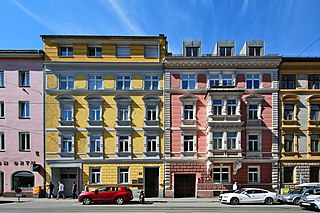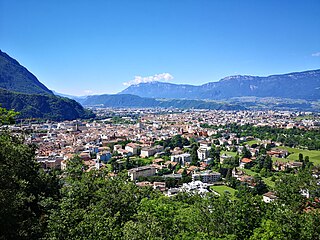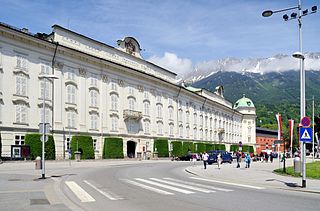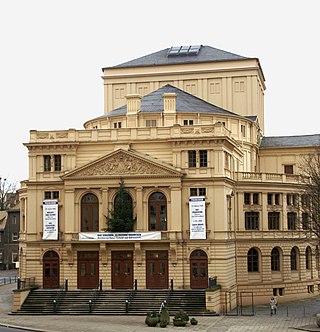History
In 1629, architect Christopher Gump the Younger converted one of the houses along a raceway from the Imperial Hofburg into a Comedihaus, the great theater of the Archduke Leopold. In 1654, a new theatre was built by Christopher Gump which opened on the other side of the raceway where the Landestheater stands today. This court theater was renovated in 1765. Following the Bavarian occupation in 1805, the theatre was called the Royal Bavarian Court National Theatre. In 1844, the theatre was closed due to disrepair.
In the 1840s, a theater company was constituted and donations were raised. The existing theatre building was opened in 1846. In 1945, the city theatre was renamed the Tiroler Landestheater (Tyrolean State Theatre). In 1959, the studio theatre in the basement was opened. The Tyrolean Provincial Theatre or main theatre was closed in 1961 and rebuilt in the following years and significantly expanded. In 1967, the main theatre was reopened. In 1991 and 1992, the theatre was renovated and converted into a flexible space theater.
In 2003, the new rehearsal stage was designed by the architect Karl Probst of Munich and completed as an extension to the main theatre. The Landestheater, with its three venues, meets the requirements of a modern stage operation and ensures that ambitious stage productions will take place in Innsbruck. As a final construction, the façade of the Landestheater was renovated and a new forecourt was added.

Innsbruck is the capital of Tyrol and the fifth-largest city in Austria. On the River Inn, at its junction with the Wipp Valley, which provides access to the Brenner Pass 30 km (19 mi) to the south, it had a population of 132,493 in 2018.

Bolzano is the capital city of the province of Bolzano - South Tyrol, in Northern Italy. With a population of 108,245, Bolzano is also by far the largest city in South Tyrol and the third largest in historical Tyrol. The greater metro area has about 250,000 inhabitants and is one of the urban centres within the Alps.

Elfriede Jelinek is an Austrian playwright and novelist. She is one of the most decorated authors to write in German and was awarded the 2004 Nobel Prize in Literature for her "musical flow of voices and counter-voices in novels and plays that, with extraordinary linguistic zeal, reveal the absurdity of society's clichés and their subjugating power". She is considered to be among the most important living playwrights of the German language.

Olga Neuwirth is an Austrian contemporary classical composer, visual artist and author. She is famed especially for her operas and music theater works, many of which have treated sociopolitical themes. She has emphasized an open-ended, interdisciplinary approach in her work, collaborating frequently with Elfriede Jelinek, exploiting live electronics, and incorporating video. In her opera Lost Highway, she adapted David Lynch's surrealist film with the same name. She has also written music for historic and contemporary films. Luigi Nono has inspired her both musically and politically.

Fritz Muliar, born as Friedrich Ludwig Stand, was an Austrian actor who, due to his huge popularity, is often referred to by his countrymen as Volksschauspieler.

The Akademisches Gymnasium Innsbruck is a public gymnasium grammar school in Innsbruck, Tyrol, Austria. Founded in 1562 by the Jesuits in the course of the Counter-Reformation, it is the oldest school in Western Austria and one of the oldest schools in the German-speaking world.

Eva Lind is an Austrian soprano singer and TV presenter. She has specialised in coloratura soprano opera roles since 1985, and sings in concerts and recitals.
Dietrich Mattausch is a German stage, film and television actor.

The Hofgarten is a protected park located on the edge of the Altstadt section of Innsbruck, Austria. The park covers an area of 10 hectares, and borders on the Hofburg, the Kongresshaus, and the Tyrolean State Theatre.

Internationales Studentenhaus (ISH) is a student accommodation company in Innsbruck, Austria. The company that built and owns the residence was founded on 15 February 1952.

Vorarlberger Landestheater is a theatre in Bregenz, Vorarlberg, western Austria. The theatre was established in 1945. Stephanie Gräve has been the manager since 2018. The theatre is due to close in the 2025/26 season for refurbishment.
Xenia Hausner is an Austrian painter and stage designer.
Der Stein der Weisen, oder die Zauberinsel is a singspiel in two acts, jointly composed by Johann Baptist Henneberg, Benedikt Schack, Franz Xaver Gerl, Emanuel Schikaneder, and Wolfgang Amadeus Mozart in 1790. The libretto was written by Schikaneder.

The Standschützen were originally rifle guilds and rifle companies that had been formed in the 15th and 16th centuries, and were involved time and again in military operations within the borders of the Austrian County of Tyrol. A Standschütze was a member of a Schützenstand, into which he was enrolled, which automatically committed him to the voluntary, military protection of the state of Tyrol. In effect they were a type of Tyrolean local militia or home guard.
Dorothea Nicolai is a German costume designer, stage designer, author and curator. From 2000 to 2007 and from 2012 to 2015 she worked as director for costumes, make-up and wigs of the Salzburg Festival. In 2017/18 she was responsible for the costumes at the Bayreuth Festival.

The Hofburg is a former Habsburg palace in Innsbruck, Austria, and considered one of the three most significant cultural buildings in the country, along with the Hofburg Palace and Schönbrunn Palace in Vienna. The Hofburg is the main building of a large residential complex once used by the Habsburgs that still includes the Noblewomen's Collegiate Foundation, the Silver Chapel, the Hofkirche containing Emperor Maximilian's cenotaph and the Schwarzen Mandern, the Theological University, the Tyrolean Folk Art Museum, Innsbruck Cathedral, the Congress, and the Hofgarten.
Christoph Marthaler is a Swiss director and musician.

The Landestheater Altenburg is a multi-part theatre in Altenburg and part of the Theater Altenburg-Gera. The venues used are the Großes Haus with 500 seats as well as the Heizhaus and the Theater unterm Dach. The general director and managing director since 2011 is Kay Kuntze.

The Landestheater Niederösterreich is a Schauspielhaus in the Lower Austrian provincial capital St. Pölten.

The Hans Otto Theatre, named after the actor Hans Otto, is a municipal theatre in Potsdam in Germany. Its headquarters and main venue is in the Großes Haus am Tiefen See in Potsdam's cultural district on Schiffbauergasse. Other regular venues are the neighbouring historic Reithalle and occasionally the Palace Theatre in the Neues Palais.















